Special Offers
Discover the true potential of Raspberry Pi with the new, official Handbook 2023. With over 200 pages of amazing projects, fun tutorials, practical guides, and clear reviews, it has everything you need to master Raspberry Pi!
Inside The Official Raspberry Pi Handbook 2023
- QuickStart guide to setting up your Raspberry Pi computer
- Make stuff with Raspberry Pi Pico W
- Incredible projects built by the global Raspberry Pi community
- Find the right kit and products for your dream builds
- Get creating with our comprehensive tutorials and guides
- Over 200 pages of essential advice!
1 x RPi 2023 Handbook




From the makers of Digital SLR Photography magazine, The Essential Guide To Landscapes is the complete guide to shooting your best ever landscape images. It’s 164 pages of essential photo technique, expert advice, and inspiration.

From learning the basics through to more involved techniques, The Essential Guide To Landscapes is packed with expert advice, photo workshops, and stunning photography to help photographers of all levels achieve their best ever results.

• Achieve maximum levels of image quality and detail
• Master camera controls and shoot like the pros
• Essential photo kit: our pick of the best ND filters and carbon tripods
• Location workshops, composition and lighting, coastal landscapes, and more!

What's in the box?
1 x Guide to landscapes photography book
AlphaBot is a robotic development platform compatible with Raspberry Pi and Arduino. It consists of the AlphaBot mainboard, the mobile chassis, and everything required to get it moving.
Just connecting a controller board, Raspberry Pi or Arduino, and combined with our open source example code, now it's all ready to start your robotic exploration: line tracking, obstacle avoidance, video monitoring, WiFi/Bluetooth/ZigBee/Infrared remote control, etc.
- Raspberry Pi/Arduino interfaces, works with either one separately, or both
- Arduino extend header, supports Arduino shields
- Modular design, plug-and-play modules like line tracking, obstacle avoidance, speed measuring, etc. eliminating the trouble of connecting mess wires.
- LM298P motor driver with diode protection circuit, more safety
- LM2596 voltage regular, provides stable 5V power to the Raspberry Pi/Arduino
- TLC1543 AD acquisition chip, allows the Pi to use analog sensors
What's on the AlphaBot Mainboard

- Raspberry Pi interface: for connecting Raspberry Pi
- Arduino interface: for connecting Arduino
- Motor interface
- Ultrasonic module interface
- Servo module interface
- Obstacle avoidance module interface
- Speed measuring interface
- Battery holder: supports 18650 batteries
- Reserved power input (not soldered): for connecting other external power supply
- Arduino expansion header: for connecting Arduino shields
- UART interface: for connecting Bluetooth module, to control the robot remotely via Bluetooth
- SPI interface: for connecting NRF24L01 wireless module
- Line tracking module interface
- TLC1543: 10-bit AD acquisition chip, allows the Pi to use analog sensors
- LM298P: dual H bridge motor driver chip, up to 2A current
- Anti-reverse diode
- Power switch
- LM2596: 5V regulator
- Power indicator
- UART switch: turn on to enable serial communication between Raspberry Pi and Arduino
- IR receiver: control the robot remotely via infrared
- Raspberry Pi/Arduino selection: select the Raspberry Pi or Arduino to control the robot peripherals






What's in the box?
Please note that the battery length SHOULD be less than 67mm, some batteries with protection plate in the market are NOT supported
- AlphaBot mainboard x1
- Tracker Sensor x1
- Photo Interrupter Sensor x2
- Infrared Proximity Sensor x2
- Motor with gearbox 2PCS x1
- AlphaBot wheel 2PCS x1
- AlphaBot acrylic chassis x1
- Motor mounting plate 4PCS x1
- omni-direction wheel x1
- 20-slots encoder disk 2PCS x1
- IR remote controller x1
- XH2.54 4cm 4Pin 2PCS x1
- XH2.54 4cm 3Pin 2PCS x1
- XH2.54 4cm 7Pin x1
- AlphaBot screws x1

Resources
You can change the communication way via the jumper cap on the shield. If all the three jumpers are connected to APC, the shield will realize the XBEE Bluetooth communication. If all jumpers are connected to 485, realize the RS485 communication function.
Onboard also comes with a reset button, a D13 indicator, and some common communication pins of 2.54mm pin pitch, such as serial port, IIC, and SPI communication pins.
Besides, it also has two 2pin terminal blocks. One is VIN GND terminal block, used to supply the external power for the UNO R3 control board, with an input voltage of DC 7-12V. The other is the Servo_PWR terminal block, used for VCC voltage input/output. If not connecting the external voltage, supply 5V for the shield; if connecting the external voltage, VCC voltage is actually the external input voltage.
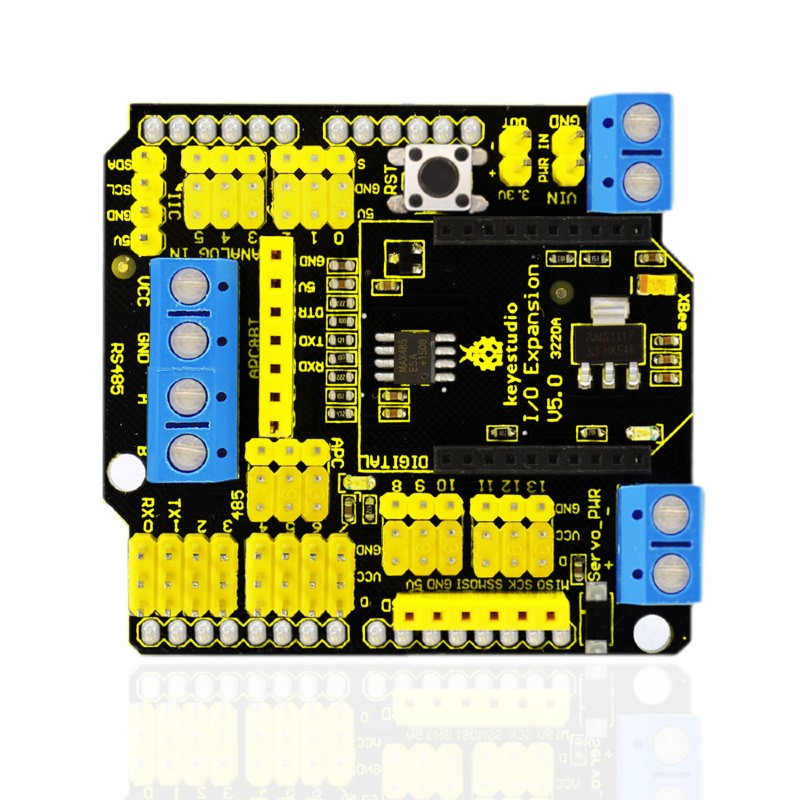
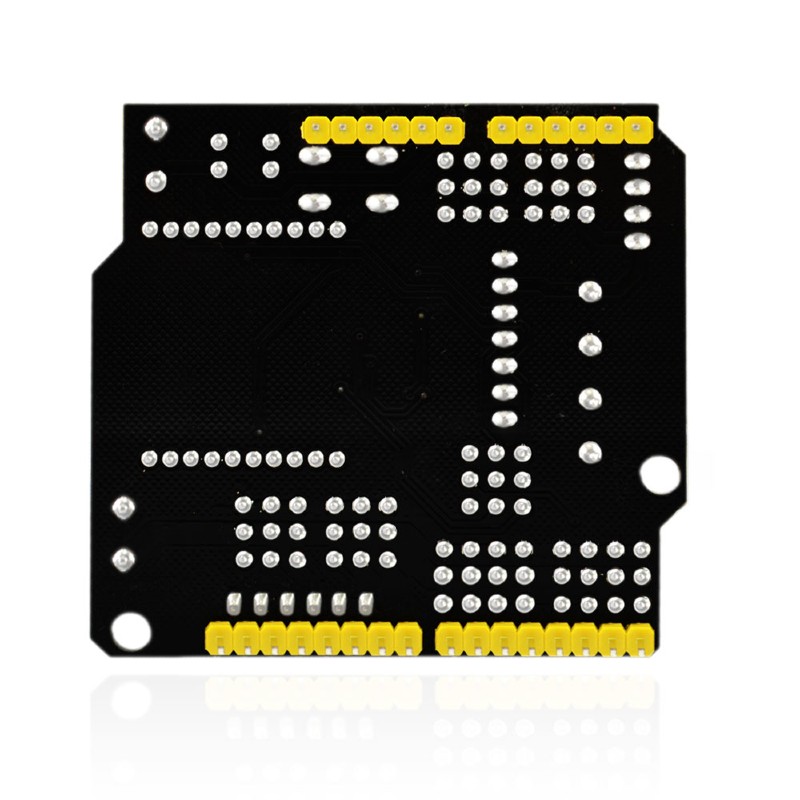
- Compatible with Arduino UNO R3.
- Comes with 14 digital input/output pins.
- Comes with 6 analog IO pins
- Onboard comes with a digital port power terminal block
- Comes with an external power input terminal block and a input contact pin ( power on the control board with DC 7-12V)
- Comes with an RS485 interface.
- Comes with a reset button
- Comes with a D13 indicator
- Comes with a XBEE Bluetooth interface
- Can connect three jumper caps (APC and 485) to switch the XBEE Bluetooth communication or RS485 communication.
- Comes with I2C, serial port and SPI communication pins
- Onboard comes with a DC 3.3V output pin
- Dimensions: 58.5mm x 57.5mm x 20mm
- Weight: 26.2g
Pinout diagram
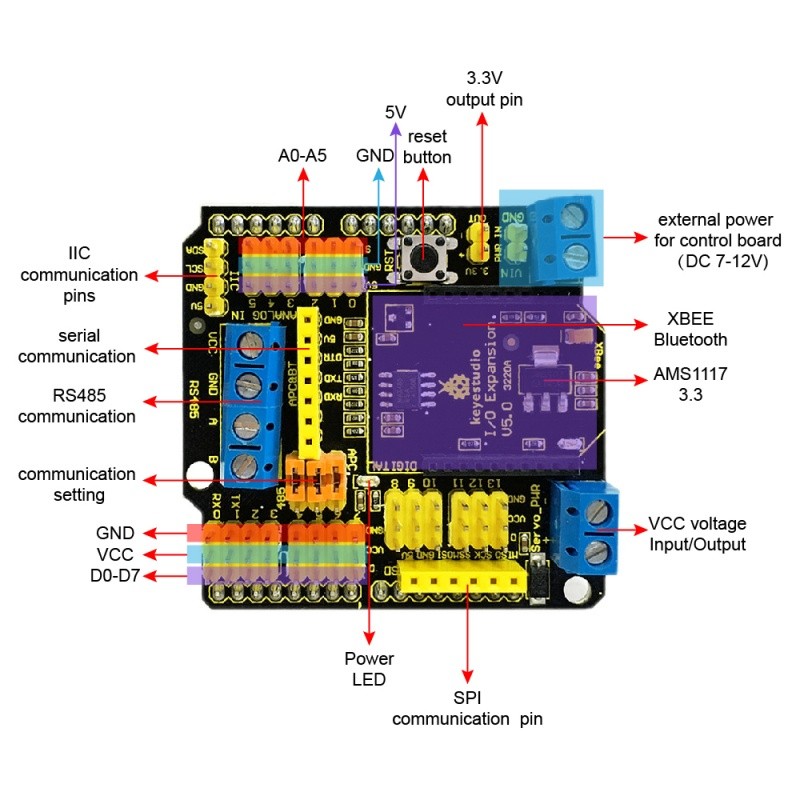
1 x XBEE Shield with RS485 for Arduino UNO
Resources
Product wiki page
Note: the CM4 is NOT included. Please buy it separately if necessary.
The Nano Base Board (B) For Raspberry Pi Compute Module 4, is the Same Size As The CM4 and is suitable For Evaluating The Raspberry Pi CM4 Or Being Integrated Into End Products.
This module is Compact, Yet Complete, featuring: Standard CM4 Socket, 40PIN GPIO, Gigabit Ethernet, USB2.0, DSI, CSI, 3.5mm Audio Jack...
Specifications
CM4 SOCKET - suitable for all variants of Compute Module 4
NETWORKING - Gigabit Ethernet RJ45 connector
CONNECTOR - Raspberry Pi 40PIN GPIO header × 1
USB - USB 2.0 Type A connector × 1
DISPLAY - MIPI DSI port × 1 (15pin 1.0mm FPC connector)
CAMERA - MIPI CSI-2 port × 1 (15pin 1.0mm FPC connector)
VIDEO - Mini HDMI port × 1, supports 4K 30fps output
AUDIO - 3.5mm jack
STORAGE - Micro SD card socket for Compute Module 4 Lite (without eMMC) variants
POWER INPUT - 5V
DIMENSIONS - 56 × 41mm
What's On Board
- CM4 socket
suitable for all variants of Compute Module 4 - Micro SD card slot
for connecting a Micro SD card with pre-burnt image (Lite variant ONLY) - 40PIN GPIO header
for connecting sorts of HATs - Gigabit Ethernet RJ45 connector
- Power supply / Programming
5V power supply, or used for eMMC burning - 3.5mm audio jack
- User button
- USB2.0 connector
for connecting sorts of USB devices
- CSI connector
MIPI CSI camera interface - DSI connector
MIPI DSI display interface - MP1658
- Mini HDMI connector
supports 4K 30fps output - BOOT switch
ON: Switch USB to Type C interface, will enter download mode when powered on (configured as a large-capacity disk through RPI boot)
OFF: Switch USB to Type A interface, will not enter download mode when powered on (booted from eMMC or Micro SD card)
Outline Dimensions
What's in the box?
1 x CM4-NANO-B
Resources
WIKI: CM4-NANO-B
This lovely little lens set is the best way to easily expand the field of view of your Raspberry Pi camera!
This lens kit means that you can use your camera module in many exciting ways:
- 1x Wide-angle lens: Ideal for capturing those landscape shots/night sky time-lapses
- 1x Macro lens: Beautiful close-up images of anything from insects to circuit boards
- 1x Fish-eye lens: Security systems and crazy 180° FOV shots
Perfect for taking shots from anywhere from your desk to the edge of space this lens comes with a back splint which means you can also use it with other camera devices such as your mobile phone.
Each lens screws into the clip which fits perfectly onto your camera module.
Features
- Compatible with the known universe *
- High-class glass lens, high clarity.
- No *vignetting or dark circle.
- Lens covers to protect the camera lenses
- Material: ABS & aluminum alloy
- Compatible with most of the official Raspberry Pi Camera Modules
* Vignetting is a phenomenon in which the corners of an image appear darker than the center due to the blocking or shading of light rays by external objects or the physical dimensions of a lens
What's in the box?
1 x camera clip
3 x screw on lenses
Please note: The third lens isn't missing; it’s actually screwed into the second lens.
- It usually takes about 0.3s for partial refresh
- Pi Header: standard Raspberry Pi 40PIN GPIO extension header, supports Raspberry Pi series boards
This is an E-Ink display HAT for Raspberry Pi, 7.5inch, 800×480 resolution, with embedded controller, communicating via SPI interface.
Due to the advantages like ultra low power consumption, wide viewing angle, clear display without electricity, it is an ideal choice for applications such as shelf label, industrial instrument, and so on.
Features- No backlight, keeps displaying last content for a long time even when power down
- Ultra low power consumption, basically power is only required for refreshing
- Standard Raspberry Pi 40PIN GPIO extension header, supports Raspberry Pi series boards, Jetson Nano
- SPI interface, for connecting with other controller boards like Raspberry/Arduino/Nucleo, etc.
- Onboard voltage translator, compatible with 3.3V/5V MCUs
- Comes with development resources and manual (examples for Raspberry Pi/Jetson Nano/Arduino/STM32)
Specifications
- Operating voltage: 3.3V~5V
- Interface: SPI
- Outline dimension: 170.2mm × 111.2mm
- Display size: 163.2mm × 97.92mm
- Dot pitch: 0.205 × 0.204
- Resolution: 800×480
- Display color: black, white
- Grey scale: 2
- Full refresh time: 5s
- Refresh power: 38mW(typ.)
- Standby power: <0.017mW
- Viewing angle: >170°
Revision History
Revision V2 has been released on 2019.11, the resolution is upgraded to 800×480, from 640×384 of V1. The hardware and interface of V2 are compatible with V1, however, the related software should be updated.
| SYMBOL | DESCRIPTION |
|---|---|
| VCC | 3.3V~5V |
| GND | Ground |
| DIN | SPI MOSI pin |
| CLK | SPI SCK pin |
| CS | SPI chip selection, low active |
| DC | Data/Command selection (high for data, low for command) |
| RST | External reset, low active |
| BUSY | Busy status output, low active |
Dimensions
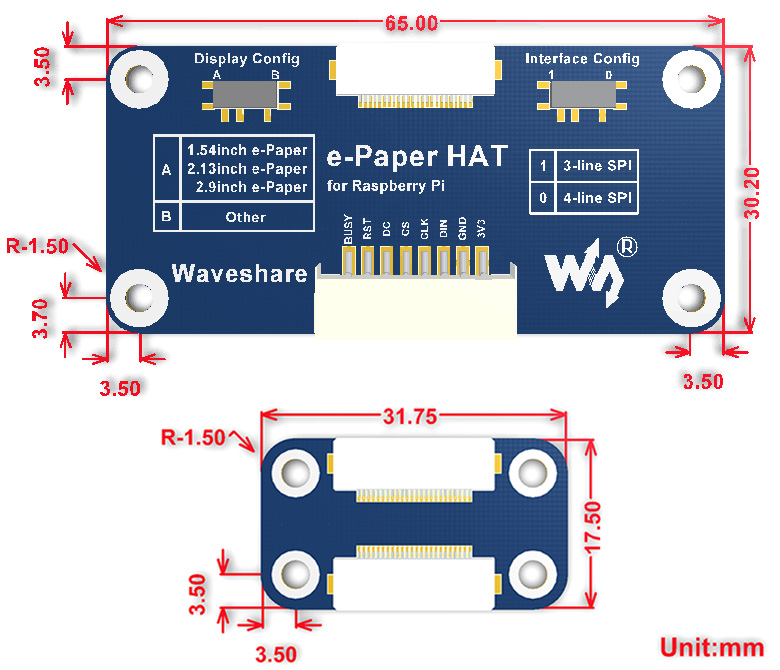
What's in the box?
- 7.5inch e-Paper x1
- e-Paper Driver HAT x1
- RPi screws pack (2pcs) x1
- PH2.0 20cm 8Pin x1
 2
2 3
3 4
4
Resources

Thanks to multi onboard protection circuits, including 500W lightningsurge, ESD protection, short circuit protection, and electrical isolation, it make the communication more safe and more reliable.
- Standard Raspberry Pi 40PIN GPIO extension header, supports Raspberry Pi series boards, Jetson Nano
- Supports both traditional CAN2.0 and CAN FD protocols
- Breakout SPI control pins, for connecting with host control boards like STM32/Arduino
- Onboard electrical isolation, up to 5KV isolated voltage, stable operation, higher anti-interference capability
- Onboard lightningproof, ESD protection, short circuit protection, more safe communication
- Onboard voltage translator, select 3.3V/5V operating voltage by jumper
- Onboard 120Ω terminal resistor, configured by jumper
- Comes with development resources and manual (examples for Raspberry Pi/Arduino)
Specifications
- CAN CONTROLLER: MCP2518FD
- CAN TRANSCEIVER: MCP2562FD
- CONTROL BUS: SPI
- POWER SUPPLY: External power supply terminal OR Raspberry Pi
- SCREW TERMINALINPUT VOLTAGE: DC 8~26V
- OPERATING VOLTAGE: 5V
- LOGIC LEVEL: 3.3V/5V
- DIMENSIONS: 65.0 × 56.5mm
What Can It Do?
Enable Isolated And Stable CAN FD Capability For Your Raspberry Pi

Designed For Raspberry Pi Series
Standard Raspberry Pi 40PIN GPIO Header, Customized For Raspberry Pi Series Boards

2-Channel CAN Support
MCP2518FD CAN Controller MCP2562FD CAN Transceiver

Electrical Isolation Circuitry Safe & Stable
SM24CANB TVS Diode, ESD Protection, Transient Peak Voltage Protection

Flexible With Handy Jumpers
Easily Select 3.3V / 5V Operating Voltage, Or Enable/Disable 120Ω Terminal Resistor, Via Onboard Jumpers

What's On Board?

- MCP2518FD controller
- MCP2562FD transceiver
- SI8642ED digital isolator
- MP1584EN power chip
- RT9193-33 power chip
- B0505LS-1W power supply isolation module
- Standard Raspberry Pi 40PIN GPIO header
- CAN bus screw terminal
- External power supply terminal
8~26V DC input - MCU control pins
for use with host boards like Arduino
- 120Ω terminal resistor switch
- 3.3V/5V logic level switch
- CAN operating mode selection
A: CAN_0 and CAN_1 use two separated SPI (default)
B: CAN_0 and CAN_1 share a single SPI - Power indicator
- 2A fast resettable fuse
- Power supply reverse-proof diode
- Power supply flow backward proof diode
- Freewheeling diode
- SM24CANB TVS diode
Pinout Definition

Outline Dimensions

What's in the box?
1 x CAN FD Expansion HAT for Raspberry P
Resources
Features
- Material: Copper
- Size: 13mm x 6mm
- Weight: 2g
- Nozzle thread: M6
- Nozzle accuracy: 0.4mm
What's in the box?
5 x 0.4mm Nozzles

Monitor soil moisture, temperature and relative humidity measurement with the Plant Monitor. This board is compatible with the BBC micro:bit, Raspberry Pi and most microcontroller boards.

Specifications
- Alligator / croc clip rings
- Ready soldered header pins for your choice of microcontroller.
- Easy to use UART serial interface
- Additional analog output for moisture only
- Built-in RGB LED
What's in the box?
1 x Moisture Sensor
Resources
Instructions (All platforms)
Instructions (Micro:bit)
Instructions (Raspberry Pi)
Instructions (Pico)
Instructions (Arduino)
Datasheet
Hi Res Images (Google File Share)
Specifications
Compatible with Model B Raspberry Pi boards (Pi 4, 3B+, 3, 2, B+)
OV5647 Sensor
Compatible with libcamera and raspicam commands
Compact size - just 35mm long!
Includes foam gaskets for creative mounting
Images up to 2592x1944
Video up to 1920x1080
Sensor: OV5647
Pixels: 5MP
Focal length: ~3.9mm
CMOS size: 1/4"
Field of View: ~73°
Aperture: F2.4
Depth of Field: ~20cm
Distortion: < 1.5%
Still Image: up to 2592x1944
Video:
1920 x 1080p @30
1280 x 720p @60
640 x 480p @60
640 x 480p @90
The new Raspberry Pi OS release includes the new Picamera2 Python camera interface.
What's in the box?
1x Mini Camera Module
Resources
- How to Install & Use the Raspberry Pi Camera Module (different camera but the process and commands are the same)
- Libcamera and the legacy Raspicam stack
- Libcamera introduction and usage
- Raspicam (legacy) introduction and usage
- OctoPrint for 3D print monitoring
- MotionEyeOS Raspberry Pi CCTV
Aid young children and elementary school students to increase their physical knowledge in a hands-on form with a simple series circuits
Specifications:
- Colour: Black
- Material: Plastic
- Battery: 2 x AA Battery (Not included)
What's in the box?
1 x Bulb Holder
1 x Battery Holder
1 x Bulb
1 x Conductive Line
2 x Crocodile clips
(batteries not included)
Specifications
A single module can drive a 8x8 dot matrix common cathode
Working voltage: 5V
Module size: 12.8 x 3.2 x 1.3 cm (L*W*H)
With 64 fixing screw holes, hole diameter: 3mm
Module with input and output interfaces, support for cascading multiple modules
What's in the box?
1 x MAX7219 Dot Matrix Module
1 x 5pin jumper Cable
Resources
Wiring
1. The left side of the module is the input port, and the right is the output port.
2. Control of a single module, the input port only need to receive CPU.
3. The more a module cascade and input end of the first module is connected with the CPU and input end of the input end of the output end is connected to the second module, output terminal of the second module connected with the three modules, and so on.
For example: 51 SCM
VCC→5V
GND→GND
DIN→P2.2
CS →P2.1
CLK→P2.0
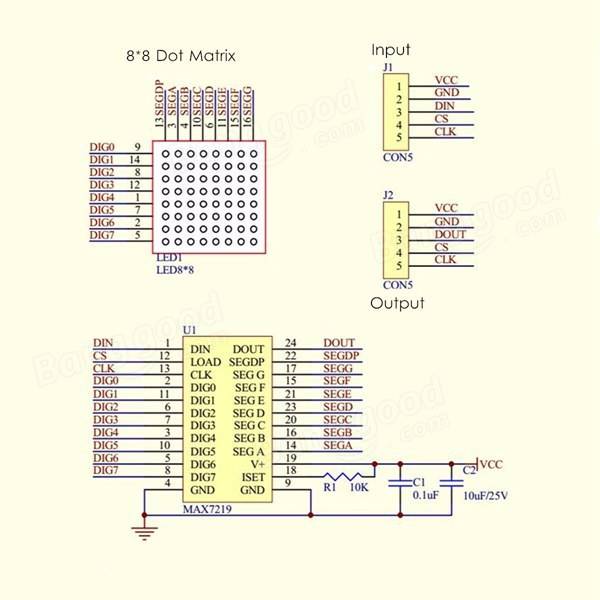
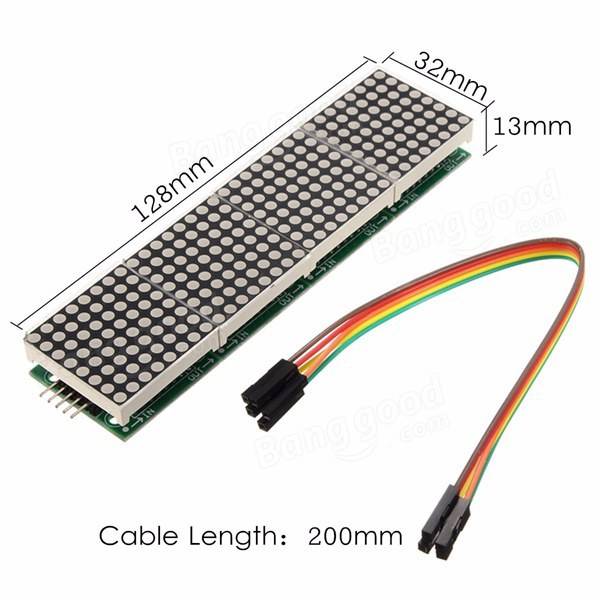
https://max7219.readthedocs.io/en/0.2.3/
Clock example
Python Library
- Tool Kit for 3D Printing Beginners
- ABS Box, Heat and Impact Resistance
- 18 PCS Set: Wrench, scissors, casing and others
- Strong Practicality, Durable

This kit includes
- Spatula
- Wrench
- 0.38mm needle
- Feeler gauge
- 1.0mm needle
- Needle nose pliers
- Side cutters large
- PTFE cutters
- SD card reader
- Cross socket wrench
- Box cutter
- Side cutters small
- Flathead screwdriver
- Phillips screwdriver
- M6 socket wrench
- M8 socket wrench
- Tweezers
- Allen key kit
What's in the box?
1 x 3D printer toolbox
The Kitronik Inventor's Kit for Arduino is a great way to get started with programming and hardware interaction with the Arduino in the classroom. This Inventor's Kit contains everything you need to complete 10 experiments including using LEDs, motors, light sensors and capacitors.
Arduino is an open-source code-able electronics platform, which has been designed for anyone making interactive projects. Arduino board can process inputs from many sensors, and also control outputs such as LEDs and motors.
The Arduino is controlled by the code with which it is programmed. This code is written in the Arduino programming language, using the Arduino development environment. Once complete the code is easily transferred to the Arduino board using a simple USB lead.
To get you off to a flying start, we have included an easy to follow tutorial book which guides you through creating the 10 experiments. You don't need any experience with programming as the tutorial book will guide you every step of the way. You'll be programming and creating circuits in no time!
Note:
- This kit requires assembly.
- No soldering is required and you can build your first circuit in minutes!
- This kit does not include an Arduino UNO.
- This kit is available as a single pack or as a pack of 20.
Features:
- No soldering required - build your first circuit in minutes!
- Make 10 experiments included in the provided step-by-step tutorial book.
- All parts are included to conduct the 10 experiments.
- Small Prototype Breadboard included for fast prototyping.
What's in the box?
1 x Mounting Plate.1 x 7 Segment Display.
1 x Servo.
1 x Potentiometer - Vertical Type (finger adjust) 100K.
1 x Finger Adjust Spindle.
4 x Plastic Spacer 10mm.
1 x Small Prototype Breadboard.
1 x Terminal Connector.
4 x Push Switch.
1 x Motor.
1 x Transistor.
2 x Red 5mm LED.
2 x Orange 5mm LED.
2 x Yellow 5mm LED.
2 x Green 5mm LED.
1 x RGB 5mm LED.
1 x Fan Blade.
5 x 2.2KΩ Resistor.
5 x 10KΩ Resistor.
10 x 220Ω Resistor.
20 x Male to Male Jumper Wires.
1 x 470uF Electrolytic Capacitor.
1 x Piezo Element Buzzer.
4 x Pan Head M3 Machine Screw.
1 x Phototransistor.
Video: https://youtu.be/aswor6BKXSY
Requires:
- An Arduino board such as The Arduino Uno, Compatible Uno, Maker Uno or Maker Uno Plus
- Phillips Screwdriver.
- Terminal Block Screwdriver.
- USB A to USB B Cable for Uno or the micro USB cable for Maker Uno and Maker Uno Plus
Inventors Kit Additional Online Resources:
- Tech Talks - live stream playback.


The Kitronik Autonomous Robotics Platform Pico, a fun and hands-on introduction to Robotics with the Raspberry Pi Pico.
The Kitronik Autonomous Robotics Platform for Raspberry Pi Pico is a fun and hands-on introduction to buggy robotics. The easy to follow booklet provided with the kit guides you through all of the steps required for you to take control of your robot. The Robotics Platform has been designed to grow with you and provided additional servo and ultrasonic sensor connectors for more advanced projects. This buggy requires a Raspberry Pi Pico with pin headers attached, you can obtain a Raspberry Pi Pico with headers attached here.
The kit is supplied with the autonomous robotics platform chassis, 2 wheels and tyres, a Kitronik line-following sensor board, and an ultrasonic sensor. The kit requires no soldering and only minimal mechanical assembly. Fit the tyres to the wheels, push the wheels onto the pre-mounted motors and both the line following sensor and ultrasonic distance sensor plug straight into the board. Once put together, push the Raspberry Pi Pico into the onboard connector, add 4 x Alkaline AA batteries to the battery holders underneath and you are done. Your robot buggy is ready for instruction.
The included booklet guides you through every step of getting to know your robot. It contains a detailed assembly guide, info on preparing the Raspberry Pi Pico, instructions for installing an editor (Thonny), and instructions on how to write code for every feature of the Robotics Platform. No corner of the board is left unexplained.
As well as the easy to follow getting started guide, we have also produced online tutorials which go into more detail on coding the key features of the board. The links to the tutorials can be found in the resources section at the foot of this page.
To help make programming the robot as simple as possible, Kitronik has developed a set of Micropython modules, which can be found here. More information on this can be found in the booklet supplied with the kit. If you aren't familiar with GIT, we've created an online beginners guide to help you get up to speed. You can find the guide here (https://kitronik.co.uk/GitGuide).

Features:
- A fun and hands-on introduction to buggy robotics.
- The Robotics Platform has been designed to grow with you, start small then add complexity later.
- The kit ships with a detailed guide booklet backed up with freely available online tutorials.
- The autonomous robotics platform introduces the user to light, movement, and sensing so the robot can be as hands-on or hands-off as want it to be.
- Program your buggy to react to the world around it.
- Learn to code with MicroPython, using our simple to follow guides and the beginner-friendly Thonny editor.
- Just add the Raspberry Pi Pico, some alkaline batteries, and some code and watch your buggy come to life!
- This buggy is not supplied with a Pico, you can obtain a Raspberry Pi Pico here.
What's in the box?
- 1 x Autonomous robotics buggy chassis PCB.
- 2 x Kitronik 5 spoke wheels and tyres.
- 1 x Kitronik line following sensor board.
- 1 x Ultrasonic Sensor.
Dimensions:
- PCB Length: 126mm.
- PCB Width: 80mm.
- Wheel Diameter (with tire): 67.5mm.
Video: https://youtu.be/vPd4gt_Gt4U
Requires:
Resources:
- Kitronik Online Tutorials, using the Pico-ARP;
- Motors.
- Lights, switch, and buzzer.
- Line Following Sensors.
- Ultrasonic Distance Sensor.
- Using the servo connectors.
- First steps with the Raspberry Pi Pico, MicroPython, and Thonny.
- Kitronik Beginners guide to GitHub.
- A practical guide to Modules, Micro Python and the Raspberry Pi Pico.
- Kitronik Micropython modules for ARP-Pico.
- Pico Datasheet.

- Getting started with MicroPython on the Pico.

- Thonny, the beginner-friendly editor.




Features:
- Designed for micro:bit V2:
- micro:bit V2 (single board)
- micro:bit V2 kit and V2 Kit including batteries
- micro:bit V2 Club (10 x Go bundle)
- Available in three good-looking colors: (choose your preferred color)
- Orange
- Yellow
- Blue
- The precise hole allows users to use all functions of the micro:bit board.
- Environmentally friendly materials, excellent workmanship.
- Material: Silicone
- Dimension: 56.5 x 10.2 x 37mm
What's in the box?
1 x Silicon Case for micro:bit V2 (Chosen Color)- The waterproof level of the waterproof box is IP66.
- 132.2mm x 68.7mm x 50.1mm
- ABS Grey
What's in the box?
1 x waterproof enclosure
100% cotton Unisex T-shirt from the Cytron for every maker that loves making stuff. Simple yet comfortable!
Comes in black color with the slogan of TRUST ME I'M A MAKER
There are several sizes of this T-shirt to accommodate everyone :) Please choose the preferred size next to the main photo. It is Unisex T-shirt so it is suitable for both male and female maker :)
- XS (Extra Small) Size
- S (Small) Size
- L (Large) Size
- M (Medium) Size
- XL (Extra Large) Size
- XXL (Double Extra Large) Size
- XXXL (Triple Extra Large) Size
Features:
- Coming from makers to makers :)
- 100% cotton, super comfortable
- The black color with:
- Front: Slogan: TRUST ME I'M A MAKER
- Back: Cytron Logo
- Available Sizes:
- Extra Small (XS):
- 36" or 91.44cm for the Chest (Chest = 2 x L)
- 25" or 63.5cm for Height
- Small (S):
- 38" or 96.52cm for the Chest (Chest = 2 x L)
- 26" or 66.04cm for Height
- Medium (M):
- 40" or 101.6cm for the Chest (Chest = 2 x L)
- 27" or 68.58cm for Height
- Large (L):
- 42" or 106.68cm for the Chest (Chest = 2 x L)
- 28" or 71.12cm for Height
- Extra Large (XL):
- 44" or 111.76cm for the Chest (Chest = 2 x L)
- 29" or 73.66cm for Height
- Double Extra Large (XXL):
- 46" or 116.84 cm for the Chest (Chest = 2 x L)
- 30" or 76.2 cm for Height
- Triple Extra Large (XXXL):
- 48" or 121.92 cm for the Chest (Chest = 2 x L)
- 31" or 78.74 cm for Height
- Extra Small (XS):

What's in the box?
1 x Trust Me T-Shirt - Black (Chosen Size)A meteorologically minded Raspberry Pi HAT designed to make hooking up weather sensors a breeze (or a squall, or a gale).
Weather HAT is a tidy all-in-one solution for hooking up climate and environmental sensors to a Raspberry Pi. It has a bright 1.54" LCD screen and four buttons for inputs. The onboard sensors can measure temperature, humidity, pressure and light. The sturdy RJ11 connectors (remember those?) will let you easily attach wind and rain sensors. It will work with any Raspberry Pi with a 40 pin header (that's most of them except the really old ones).
You could install it outside in a suitable weatherproof enclosure (like a waterproof junction box or even a Tupperware container) and connect to it wirelessly - logging the data locally or piping it into Weather Underground, a MQTT broker or a cloud service like Adafruit IO. Alternatively, you could house your weather Pi inside and run wires to your weather sensors outside - making use of the nice screen to display readouts.
Please note: the wind and rain sensors are sold separately.
Features
- 1.54" IPS LCD screen (240 x 240)
- Four user-controllable switches
- BME280 temperature, pressure, humidity sensor (datasheet)
- LTR-559 light and proximity sensor (datasheet)
- Nuvoton MS51 microcontroller with inbuilt 12-bit ADC (datasheet)
- RJ11 connectors for connecting wind and rain sensors (sold separately)
- HAT-format board
- Fully-assembled
- Compatible with all 40-pin header Raspberry Pi models
- Python library
- Schematic
What's in the box?
1 x Weather HAT
2 x 10mm standoffs
Raspberry Pi and accessories are sold separately
Software
We've put together a Python library to give you easy access to all Weather HAT's functions, together with straightforward examples to help you learn how to read the sensors and use all the individual parts. There's also a weather station example that shows you how it's possible to combine all the functions into an application.
Our Getting Started tutorial contains a thorough walkthrough of Weather HAT's functionality plus beginner friendly instructions for installing the Python library and running the examples.
Notes
- Want to add on more I2C sensors? No problem, there's an solderless I2C header located on the back of the HAT that you can poke jumper / DuPont wires in to.
- If you'd like to hook up more analog sensors (3.3v max) we've broken out some extra ADC channels on the front of the board, as well as a convenient 3v3 power and ground.
- We've found two standoffs at the GPIO edge to be sufficient to keep this HAT firmly in place, but if you're attaching it to a full-size Pi and want to add standoffs at every corner you can pick up some more.
- Dimensions: 65 x 56.5 x 19 mm (L x W x H, including header and connectors)






















